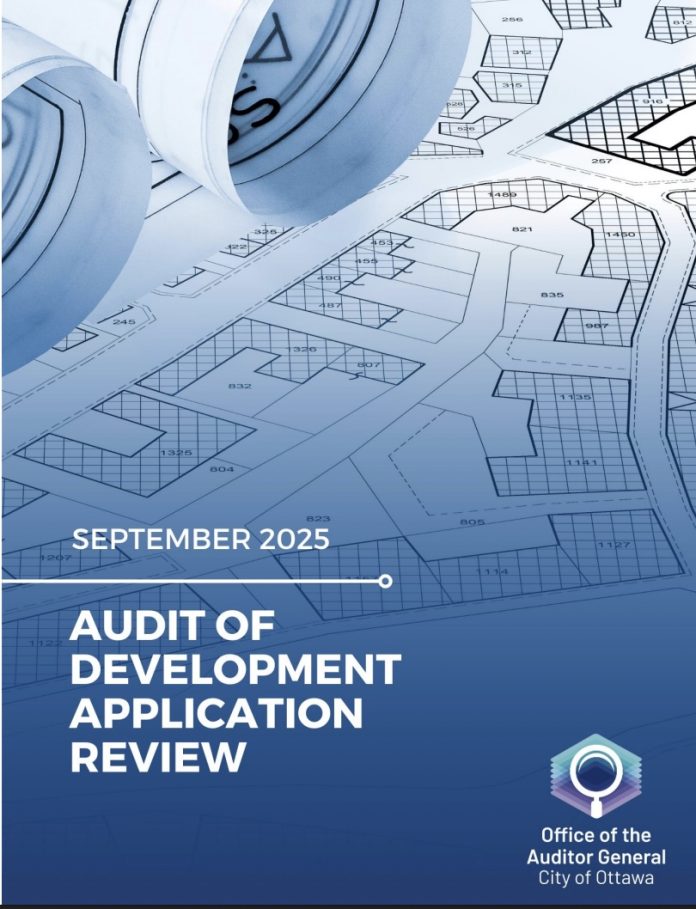By Mark Buckshon
Ottawa Construction News staff writer
While the City of Ottawa has successfully reduced its internal processing times for many development applications, crippling delays in the post-approval stage are creating significant bottlenecks, with timelines for legal agreements stretching into years, a new audit has found.
The “Audit of Development Application Review,” tabled Sept. 12 by city Auditor General Nathalie Gougeon, paints a mixed picture of a city under immense pressure to accelerate housing development while balancing its role as a regulator and steward of municipal assets.
The audit reveals that while a new team-based approach has had a positive impact on review times before a decision is made, the subsequent phase of preparing and registering legal agreements is experiencing worsening delays, increasing risks and costs for developers.
“This audit provides insights into existing challenges in the development application review process and our recommendations support further efficiency and transparency,” said Gougeon in a statement.
She acknowledged the difficult position the city is in, caught between provincial mandates to build more homes and its fundamental duties. “The audit recognizes the challenging position that the city is in; being both a regulator of housing and steward of municipal assets, while also working to reach its housing targets.”
The report contains seven recommendations, all of which city management has agreed to implement:
Post-approval delays a “significant pain point”
The most critical issue identified for the development industry is the ballooning timeline for post-approval activities, particularly the drafting and registration of legal agreements for Site Plan Controls and Plans of Subdivision. These agreements are crucial as they provide legal clarity, outline developer obligations, and are often required to secure construction financing.
According to the audit, developers cited these delays as one of their most “significant pain points,” capable of causing them to miss housing development closings.
The data presented in the audit is stark:
Site Plan Controls: The average time from approval to the registration of a legal agreement has soared from 284 days in 2022 to 649 days in 2024. This near-doubling of the timeline occurred while the number of agreements registered slightly decreased.
Plans of Subdivision: The situation is even more pronounced for subdivisions. In 2024, the average time from draft approval to registration reached an astonishing 1,319 days, or 3.6 years.
The report attributes these delays to a combination of factors, including incomplete submissions from applicants, late consultation with the city’s Legal Services department, inconsistent conditions from different city departments, and aggressive attempts by some developers to bypass the queue.
A key constraint identified is a lack of dedicated resources within Legal Services, where no solicitors are focused exclusively on development agreements. Furthermore, the audit found that the city’s primary tracking software, MAP, is not consistently updated during the post-approval phase, leaving planning staff and applicants with little visibility into a file’s status.
In response to the pressure, the city has sometimes permitted “early servicing” or a “limited commencement of work” before agreements are finalized. While this can accelerate construction, the audit warns it exposes the city to increased legal risk, as conditions of approval may not be legally enforceable.
To address this, the Auditor General recommended that the City Solicitor conduct a resourcing analysis to determine the appropriate number of legal staff needed, and that Legal and Planning Services work together to define expectations and implement a common file tracking system. Management agreed, committing to complete the resourcing analysis by the end of 2025 and implement tracking improvements by mid-2026.
Progress in pre-approval, but internal processes need clarity
While the post-approval stage is a major concern, the audit found that the city has made positive strides in the initial review process. Changes like the introduction of a team approach to file management have led to a “trend of decreasing net city processing times to decision for many types of applications.”
For example, for non-complex Site Plan applications, 75 per cent were processed by the city in under 60 days in 2024, a significant improvement from 49 per cent in 2023.
However, the audit also flagged weaknesses in the internal review process itself. It found that decision-making authorities between the Planning Services File Lead and subject matter experts from other departments (like Infrastructure and Water Services) have not been formally defined.
In one case reviewed by auditors, an application for an Official Plan and Zoning By-law Amendment proceeded even though engineering issues raised by a subject matter expert had not been resolved. The decision by the File Lead to proceed without clearance was not formally documented in the file.
The report notes a lack of a formal mechanism, such as a checklist or sign-off, to confirm that all comments from internal and external experts have been satisfactorily addressed before an application moves forward. This “increases the risk that the city cannot demonstrate that it completed the necessary due diligence,” the report states.
Recommendations 5 and 6 call on the Director of Planning Services to formally establish these decision-making authorities and implement a system to ensure the resolution of all comments is sufficiently documented. Management has agreed and will undertake a process review, with a target completion of Q4 2026 for formalizing authorities.
The Greater Ottawa Home Builders’ Association (GOHBA) issued a statement expressing its “strong support for the recent findings and recommendations,” commending the Auditor General for identifying “systemic gaps and deficiencies.”
GOHBA said its members are directly impacted by the issues flagged in the report, including “process inefficiencies and inconsistencies that contribute to delays, uncertainty, and unpredictability for applicants.”
The association strongly endorsed all seven of the Auditor General’s recommendations, particularly those calling for clearer timelines, improved file tracking, and the adoption of modern performance metrics to increase accountability.
“A predictable, transparent approvals process is critical to delivering the housing supply Ottawa urgently needs,” GOHBA stated, noting that reducing uncertainty lowers costs for builders and buyers alike.
GOHBA urged City Council to “act swiftly” to implement the recommendations and to provide the necessary resources to the planning and legal departments to ensure their success.
“GOHBA stands ready to work with the city to advance these reforms,” the statement continued, adding that it anticipates the upcoming recommendations from the Mayor’s Housing Innovation Taskforce will build upon the Auditor General’s findings.
The city’s management has agreed to all seven of the audit’s recommendations.
A full copy of the audit is available here.








